
ORGANISMS DIVERSITY & EVOLUTION
metrics 2024
Empowering Research: Shaping the Future of Biodiversity Science
Introduction
Organisms Diversity & Evolution is a premier academic journal published by Springer Heidelberg, dedicated to advancing the fields of ecology, evolution, behavior, and systematics. Established in 2001 and continuing through 2024, this journal plays a crucial role in disseminating high-quality research that explores the complexities of biological diversity and evolutionary processes. With a commendable 2023 Scopus ranking of #253/721 in its category, placing it in the 64th percentile, and categorized in the Q2 quartile for Ecology and Evolution, it consistently attracts contributions from leading scientists and researchers worldwide. Although it operates on a subscription basis, the journal's rigorous peer-review process and dedication to impactful scientific discourse make it an invaluable resource for academics, practitioners, and students keen on understanding the intricate relationships that shape our biodiversity. By highlighting innovative research and fostering discussions on urgent ecological challenges, Organisms Diversity & Evolution serves as a vital platform for those committed to conservation and evolutionary biology.
Metrics 2024
 0.67
0.67 1.90
1.90 2.00
2.00 53
53Metrics History
Rank 2024
Scopus
IF (Web Of Science)
JCI (Web Of Science)
Quartile History
Similar Journals

Arthropod Systematics & Phylogeny
Connecting genetics and systematics in arthropod research.Arthropod Systematics & Phylogeny is a pivotal journal published by the SENCKENBERG NATURHISTORISCHE SAMMLUNGEN DRESDEN, MUSEUM TIERKUNDE in Germany, dedicated to advancing the understanding of arthropod systematics, phylogenetics, and evolutionary biology. With an ISSN of 1863-7221 and an E-ISSN of 1864-8312, this journal has established itself as a reputable source for high-quality research, evident by its ranking in the Q1 category for Insect Science and Q2 in Genetics. Covering a spectrum of subjects within the realms of agricultural and biological sciences, it caters to a diverse audience of researchers, professionals, and students eager to explore the intricate relationships and evolutionary histories of diverse arthropod taxa. The journal has been consistently publishing impactful studies since its inception in 2009, with ongoing contributions expected to bolster its presence in the academic community through 2024 and beyond. Although it currently does not offer open access options, its rich content serves as a valuable resource for those passionate about entomology and genetics, fostering collaboration and innovation in an important area of biological research.
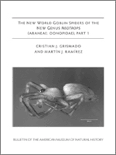
BULLETIN OF THE AMERICAN MUSEUM OF NATURAL HISTORY
Championing high-quality research for a sustainable future.BULLETIN OF THE AMERICAN MUSEUM OF NATURAL HISTORY, published by the American Museum of Natural History, represents a cornerstone of scholarly communication in the fields of Agricultural and Biological Sciences and Ecology. With an impressive impact factor highlighted by its Q1 quartile rankings in both categories, the journal publishes high-quality, peer-reviewed research that significantly contributes to the understanding of natural history. Researchers will find this journal indispensable as it covers a diverse range of topics, providing insights that drive ecological research and biological discovery forward. Although not open access, the Bulletin is widely available through institutional subscriptions, making it accessible to both established professionals and students eager to stay informed about the latest advancements in the field. Its commitment to advancing knowledge from 1996 to the present ensures that it remains relevant and highly regarded within the scientific community.
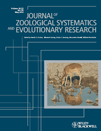
JOURNAL OF ZOOLOGICAL SYSTEMATICS AND EVOLUTIONARY RESEARCH
Exploring the Depths of Evolutionary InsightsThe Journal of Zoological Systematics and Evolutionary Research, published by Wiley-Hindawi, stands as a premier academic journal since its establishment, showcasing cutting-edge research in the fields of Animal Science, Zoology, and Ecology. With an impressive track record spanning from 1963 to the present, this journal has earned a Q1 classification in both Animal Science and Ecology, as well as recognized rankings in Genetics and Molecular Biology. Its impact is highlighted by its Scopus ranks, placing it in the top percentile for relevant categories, underscoring its vital role in advancing knowledge and understanding within these disciplines. Researchers, professionals, and students will find a wealth of high-quality, peer-reviewed articles that contribute to the evolutionary understanding of biodiversity and systematics. Though not an Open Access journal, it remains accessible to a wide audience committed to exploring the intricacies of zoology and evolutionary biology.
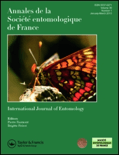
ANNALES DE LA SOCIETE ENTOMOLOGIQUE DE FRANCE
Advancing the frontiers of insect science.ANNALES DE LA SOCIETE ENTOMOLOGIQUE DE FRANCE, published by Taylor & Francis Ltd, is a prestigious journal that focuses on the dynamic field of entomology, offering a platform for the dissemination of innovative research related to insect science and ecological systems. With an increasing impact factor and notable quartile rankings (Q2 in both Ecology, Evolution, Behavior and Systematics, and Insect Science), the journal serves as a vital resource for researchers, professionals, and students alike, stimulating advances in our understanding of insect biology and its implications for broader ecological contexts. Although it is not an Open Access journal, it boasts a strong reputation within the academic community, as evidenced by its significant Scopus rankings and a commitment to high-quality peer-reviewed content. With its extensive historical archive since 1988 and a continuous publication schedule through 2024, ANNALES DE LA SOCIETE ENTOMOLOGIQUE DE FRANCE remains an essential reference for those engaged in the study of entomology and related ecological fields. For more information, visit the publisher's site at Taylor & Francis Ltd.

Vertebrate Zoology
Bridging Science and Discovery in Vertebrate ZoologyVertebrate Zoology is a prestigious open-access journal published by the Staatliches Museum Tierkunde Dresden in Germany, focusing on the intricate and diverse field of animal biology. With an ISSN of 1864-5755, the journal has established itself as a vital resource for researchers, professionals, and students in the realms of Animal Science and Ecology, Evolution, Behavior, and Systematics. Since transitioning to open access in 2021, it has expanded accessibility and global dissemination of research findings, showcasing significant studies that contribute to our understanding of vertebrate fauna. The journal's impressive Q1 quartile rankings in both Animal Science and Zoology, as well as Ecology and Evolution, underscore its influence within the academic community—ranking #95 and #220 in their respective categories according to Scopus. Spanning from 2011 to 2024, Vertebrate Zoology aims to provide a comprehensive platform for innovative research, fostering collaboration and advancing knowledge across the biological sciences.

CONTRIBUTIONS TO ZOOLOGY
Fostering Collaboration in the World of ZoologyCONTRIBUTIONS TO ZOOLOGY, published by BRILL, is a premier scholarly journal dedicated to advancing the field of zoological sciences. With an ISSN of 1383-4517 and an E-ISSN of 1875-9866, this journal serves as a vital platform for researchers, professionals, and students seeking to share their findings and insights related to animal science, ecology, evolution, and systematics. Recognized for its high academic standards, it ranks in the top quartile (Q1) for Animal Science and Zoology, and Q2 for Ecology, Evolution, Behavior, and Systematics, reflecting its significance and influence in the scholarly community. The journal has been consistently published since 1994 and continues to contribute pivotal knowledge that informs and shapes contemporary zoological research. Researchers can access the journal through traditional subscription models, ensuring broad dissemination of its impactful articles and studies. Contributions to Zoology plays an essential role in fostering collaboration and discussion within the zoological community in the Netherlands and beyond.
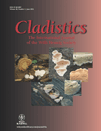
CLADISTICS
Connecting Researchers through Rigorous Scientific InquiryCLADISTICS is a premier academic journal published by WILEY, dedicated to advancing the fields of ecology, evolution, behavior, and systematics since its inception in 1985. Renowned for its rigorous peer-review process and commitment to high-quality research, the journal is listed in the top quartile (Q1) of its category as of 2023, ranking 50th out of 721 journals in the Scopus database, placing it in the 93rd percentile. This significant standing underscores its critical role in the dissemination of pioneering research and methodologies that are shaping modern evolutionary biology. With a focus on clade-based phylogenetic studies and their applications, *CLADISTICS* serves as a vital resource for researchers, professionals, and students alike, fostering a deeper understanding of biodiversity and evolutionary processes. Although it does not offer open access, the journal is committed to providing comprehensive, state-of-the-art content that continues to influence the scientific community and guide future research directions.
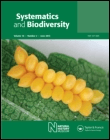
SYSTEMATICS AND BIODIVERSITY
Elevating the discourse in plant science and biodiversity studies.Systematics and Biodiversity, published by Taylor & Francis Ltd, is a prominent academic journal that provides a vital platform for advancing research in the fields of ecology, evolution, and plant science. With an ISSN of 1477-2000 and an E-ISSN of 1478-0933, the journal has established itself as a reputable source of scholarly information since its inception in 2003, and continues to publish cutting-edge studies through 2024. Recognized for its rigorous peer-review process, it holds a prestigious position in academic circles, reflected by its Q2 ranking in Ecology, Evolution, Behavior and Systematics and Q1 ranking in Plant Science as of 2023. The journal's contributions are further characterized by its strong performance in Scopus rankings, placing it in the 69th and 68th percentiles in its respective categories. Researchers, professionals, and students alike will find invaluable insights and innovative methodologies within its pages, making Systematics and Biodiversity an essential resource for those dedicated to understanding the complexities of biological diversity and systematics. The journal's impact factors and commitment to high-quality research underscore its significance in shaping the future of ecological and botanical studies.

BRITTONIA
Exploring the Richness of Botany and EcologyBRITTONIA, published by Springer, stands as a reputable journal dedicated to advancing the fields of botany and plant sciences. With a storied history dating back to 1931, this journal has evolved to embrace contemporary research spanning various aspects of plant biology, ecology, and systematics. Focusing on a comprehensive analysis of both ecological interactions and plant systematics, BRITTONIA plays a crucial role in disseminating knowledge among researchers and professionals committed to understanding plant life and its environmental contexts. Despite its open access status being currently unavailable, the journal ensures wide accessibility through institutional subscriptions. In the latest rankings, it proudly holds a Q2 category in Plant Science and a Q3 category in Ecology, Evolution, Behavior, and Systematics, indicating its growing influence and academic rigor. Researchers and students alike will find BRITTONIA an essential resource for the latest findings and discussions in plant sciences.

Annual Review of Ecology Evolution and Systematics
Illuminating the Path of Ecological and Evolutionary ResearchThe Annual Review of Ecology, Evolution, and Systematics, published by Annual Reviews, is a leading academic journal dedicated to advancing the understanding of ecological and evolutionary processes. With a commendable impact factor and impressive rankings—9th in both the Ecology, Evolution, Behavior and Systematics category and the Environmental Science category—this journal is recognized for its rigorous peer-reviewed articles that synthesize research findings across a wide range of topics within the fields of ecology and evolutionary biology. Established in 2003, this annual publication aims to provide researchers, professionals, and students with comprehensive insights into the latest developments and trends within these dynamic disciplines. By facilitating access to high-quality scholarly articles, the Annual Review of Ecology, Evolution, and Systematics continues to play a crucial role in fostering scientific discourse and discovery.